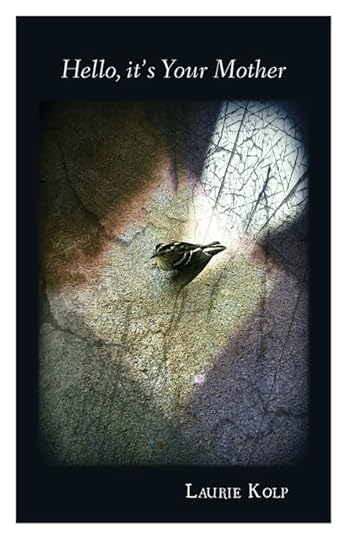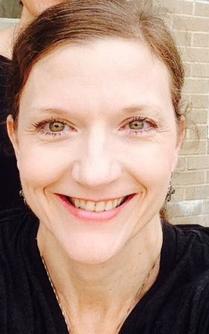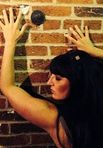carpe noctem Chapbook Interview With Laurie Kolp
 Published by Finishing Line Press in 2015 THINGS WE’D LOVE TO KNOW…
Published by Finishing Line Press in 2015 THINGS WE’D LOVE TO KNOW…Let’s start with the book’s title and your cover image. How did you choose each? And, if I asked you to describe or sum up your book, what three words immediately come to mind?
My mother, bless her soul, used to call me many times a day and I’d get so aggravated about it. The title not only signifies my irritation, but it represents my longing to hear her voice again. I designed the cover from a photo I took while on a writing retreat in Arkansas. I saw it as a sign that she was there with me.
Three words: love, (dis)connectedness, forgiveness.
What were you trying to achieve with your chapbook? Tell us about the world you were trying to create, and who lives in it.
I wanted to create a photo album, per se, of poems that vacillate back and forth between the present and past, good and bad. I was fortunate to have the opportunity to care for my mother in the end, which came within five months of our learning her prognosis. My relationship with her had been tumultuous at times, and I realized this wasn't uncommon between mothers and daughters. I was able to forgive my mother as I cared for her. In fact, she taught me one final lesson during those months: in the end nothing matters except love. I hope Hello, it’s Your Mother will encourage others to let go of resentment and come to realize we all do the best we can in life … even our mothers.
Can you describe your writing practice or process for this collection? Do you have a favorite revision strategy?
As you can expect, I wrote like a madwoman during this time. I wanted to capture as much of what I was experiencing as I could, and the therapeutic aspect of writing was very cathartic and eye-opening for me. After Mom’s passing, it took me several months before I could go back and look at the poems again. I like doing that anyway because it gives me time to detach, become less overprotective of my poems. Funny how that goes because delving into revisions helped me detach from my grief, too.
How did you order the poems in the chapbook? Do you have a specific method for arranging your poems or is it sort of haphazard, like you lay the pages out on the floor and see what order you pick them back up in?
I always print out my poems and arrange them on my king-size bed, and it seems like they always find their spot for me after I choose the first poem. I can’t really explain how that happens.
What do you love to find in a poem you read, or love to craft into a poem you’re writing?
I love to be wowed by imagery/language connections. Great poems I’m left wishing I’d written touch me because I can relate to them and am changed in some way by them. I also like an ending that pulls me back to the beginning for another read (and another).
Can you share an excerpt from your book? And tell us why you chose this poem for us to read – did it galvanize the writing of the rest of the collection? Is it your book’s heart? Is it the first or last poem you wrote for the book?
The poem I’ll share with you, "The Silhouette," is the first poem in Hello, it’s Your Mother, although it very well could have been the last. I decided to share this poem with you because … well, I love it and I hope you do, too.
The Silhouette
Cancer has worn their clothes thin--
daughter buried
next to mother
fingers stroking ragdoll arm,
head to still chest
so that we can only see
a silhouette of one.
You waited for me to come back to the hospital
before you drew your final breath. When I left
I whispered in your ear I’d be right back
to spend the night. When I returned
I whispered in your ear, I’m back.
Minutes later you were gone.
I crawled into the bed and knew
that you were gone.
When I turned your face towards mine
a stream of blood trickled out the corner
of your mouth. I dabbed it with my tissue,
placed my head atop your breathless chest
the essence of your presence like an echo,
my hope for God’s assurance--
a whisper from within that you’re okay.
It was wrong for the nurses
to tell us you might go on for days.
This process of dying takes time, they’d said.
Had I known, I never would have left.
The tear-dammed daughter
clinging to her mother’s body
until the leak finally springs.
If you had to convince someone walking by you in the park to read your book right then and there, what would you say?
No fair … this is a hard question! I’m a very quiet person and I find it difficult walking up to strangers to promote myself. Let’s see. I’d start out by, “When was the last time you talked to your mother?”
For you, what is it to be a poet? What scares you most about being a writer? Gives you the most pleasure?
Being a poet is living in the now. It is slowing down long enough to get in touch with your feelings and connect them to the relationships in this universe, whatever those relationships may be. I’m not too scared anymore because I’ve gotten used to the rejections. They used to terrify me, though. I love it when someone contacts me just to tell me how much one of my poems touched them. I also like listening to their different interpretation of my work.
Are there other types of writing (dictionaries, romance novels, comics, science textbooks, etc.) that help you to write poetry?
I often write found poetry using classic novels such as To Kill a Mockingbird, Jane Eyre, The Call of the Wild, etc. In fact, when I am in a rut this helps tremendously.
What are you working on now?
I’m working on another chapbook, but just recently went back to teaching after a 14-year hiatus. That is keeping me very busy.
What book are you reading that we should also be reading?
Julie Brooks Barbour’s Beautifully Whole and E. Kristin Anderson’s poems I wrote to Prince in the middle of the night just came in the mail. I can’t wait to delve into them.
Without stopping to think, write a list of five poets whose work you would tattoo on your body, or at least write in permanent marker on your clothing, to take with you at all times.
Emily Dickinson, Maya Angelou, Robert Frost, Mark Strand, Claudia Emerson.
What’s a question you wish I asked? (And how would you answer it?)
What is one of your favorite poems? "Still I Rise" by Maya Angelou.
***
Purchase Hello, It's Your Mother directly from Laurie Kolp via PayPal at lkkolpbmt@yahoo.com, or through Finishing Line Press.
 Laurie Kolp serves as president of Texas Gulf Coast Writers and Secretary for Beaumont Poetry Society. She authored the full-length collection Upon the Blue Couch (Winter Goose Publishing, 2014) and chapbook Hello, it’s Your Mother (Finishing Line Press, 2015). Published widely, Kolp's poetry has appeared in the 2015 Poet’s Market, Scissors & Spackle, Driftwood Press, Concho River Review, Pirene’s Fountain, and more. Kolp is a not-so-recent graduate of Texas A&M University and lives in Beaumont with her husband, three children, and two dogs. She also enjoys running, photography, and tutoring children with dyslexia. Find her online at http://lauriekolp.com.
Laurie Kolp serves as president of Texas Gulf Coast Writers and Secretary for Beaumont Poetry Society. She authored the full-length collection Upon the Blue Couch (Winter Goose Publishing, 2014) and chapbook Hello, it’s Your Mother (Finishing Line Press, 2015). Published widely, Kolp's poetry has appeared in the 2015 Poet’s Market, Scissors & Spackle, Driftwood Press, Concho River Review, Pirene’s Fountain, and more. Kolp is a not-so-recent graduate of Texas A&M University and lives in Beaumont with her husband, three children, and two dogs. She also enjoys running, photography, and tutoring children with dyslexia. Find her online at http://lauriekolp.com.
Published on January 07, 2016 04:06
No comments have been added yet.



